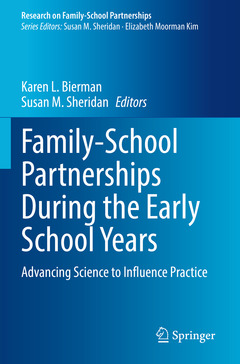Description
Family-School Partnerships During the Early School Years, 1st ed. 2022
Advancing Science to Influence Practice
Research on Family-School Partnerships Series
Language: English
Subjects for Family-School Partnerships During the Early School Years:
Keywords
Child-Parent Centers (CPC) program and preschool; Early childhood health and development; ECE (early childhood education) and parent engagement; Educational policy and early academic achievement; Family Check-Up; social support and behavioral adjustment; Family-school partnerships and elementary school; Family-school partnerships; preschool and kindergarten; Getting Ready (GR) Intervention & family-school partnerships; Head Start and early childhood education; Home-school connection and child education; Parent engagement and academic performance; ParentCorps & culturally relevant family-school partnerships; Parent-teacher interactions & early childhood learning; Positive school outcomes & family-school partnerships; REDI-Parent Program and school success; School- and community-based interventions; School readiness and success; Social-emotional development & family-school partnerships; Socioeconomic status and student engagement; Student readiness assessment and academic success
Publication date: 11-2022
150 p. · 15.5x23.5 cm · Paperback
Publication date: 11-2021
150 p. · 15.5x23.5 cm · Hardback
Description
/li>Contents
/li>Biography
/li>Comment
/li>
This book presents research-based family-school intervention programs that target the specific developmental period of preschool through the early elementary years, focusing on promoting positive child transitions into school. It explores critical intervention issues, including the need to understand mechanisms of efficacy, issues with real-world implementation, and methods for scaling family-school interventions. The volume references developmental research to highlight the importance of family-school partnerships at this critical transition period. Several chapters briefly describe research on proven intervention models that are effective in promoting family-school partnerships as children enter kindergarten and foster positive school outcomes.
Each chapter concludes with a review of the most critical next steps in family-school intervention research within the context of the early school years. At the end of the book, several commentary chapters address overall implications for future research and methods for advancing the field, including perspectives on research-informed family-school practices and policies. Not only does the volume highlight interventions that work effectively to engage families with schools, it focuses on identifying critical components and processes that may underlie effective intervention outcomes and offers agendas for future research and intervention diffusion efforts.
Key topics of coverage include:
- Presenting the logic model of the intervention program.
- Exploring questions concerning critical elements of family-school partnerships that may account for children?s positive outcomes. Discussing the challenges and strategies for scalability and broad diffusion.
Family-School Partnerships During the Early School Years is a valuable resource for researchers, professionals and graduate students in child and school psychology, educational policy and politics, family studies, developmental psychology, sociology of education, sociology, and anthropology.
Karen L. Bierman, Ph.D., is an Evan Pugh University Professor, Professor of Psychology and Human Development and Family Studies, and Director of the Child Study Center at The Pennsylvania State University. Her more than 30-year research career has focused on social-emotional development and children at risk, with an emphasis on the design and evaluation of school-based programs that promote social-emotional competence and school readiness. She has directed several longitudinal studies evaluating the long-term impact of early school-based and family-focused preventive interventions designed to reduce aggression (Fast Track) and enhance school success (Head Start REDI). She also directs a predoctoral training program in the interdisciplinary educational sciences. Dr. Bierman’s research has been funded by NICHD, IES, NIMH, Robert Wood Johnson Foundation, W.T. Grant Foundation, and W.K. Kellogg Foundation. She has served as an educational adviser to several organizations devoted to improving early education for disadvantaged children, including Head Start and Sesame Street.
Susan M. Sheridan, Ph.D., is a George Holmes University Professor of Educational Psychology at the University of Nebraska-Lincoln whose research focuses on family-school partnerships and family engagement. For more than 30 years, she has been researching the efficacy of two relationally oriented, strengths-based interventions aimed at supporting parent-teacher collaboration across the early childhood (birth to age 5) and school age years (kindergarten to grade 3). The Getting Ready intervention promotes parents’ competence in supporting children’s early development through strategies that enhance engagement and goal-directed partnerships. Teachers and Parents as Partners (also known as conjoint behavioral consultation) supports shared responsibilities and joint problem solving among parents and teachers of elementary aged children to address challengin
Emphasizes the importance of family-school partnerships as children transition into formal schooling
Examines research-based programs targeting preschool through early elementary grades
Explores mechanisms of efficacy, issues with real-world implementation, and methods for scaling
Reviews proven intervention models that promote family-school partnerships as children enter kindergarten and foster positive school outcomes




